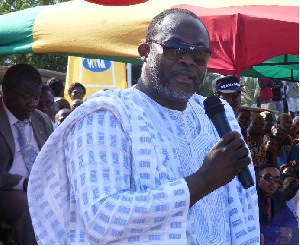The Chief Executive Officer (CEO) of the Commonwealth Telecommunications Organisation (CTO), Dr. Ekwow Spio-Garbrah, has given notice to the international governing Council of the CTO that he intends to step down as CEO of the London-based international organization in 2011 and will not seek another 4-year mandate.
A statement from CTO office in London said the Mr. Spio-Garbrah’s decision came as a surprise and disappointment to many delegates at the just-ended CTO Council meeting in Colombo, Sri Lanka who wanted him to stay on for another 4-year term.
It said Dr. Spio-Garbrah is the first African to have headed the CTO since its founding in 1901.
“Dr. Spio-Garbrah was appointed to the top international post in 2003 after a global search to which some 100 ICT experts from around the globe responded”.
He is eligible under the CTO’s constitution to be re-appointed to another 4-year term but decided to forgo that and “return home to assist the NDC as it prepares for the critical 2012 elections.
Ghana’s delegation to the CTO conference in Sri-Lanka described Dr. Spio-Garbrah’s announcement as ‘disheartened’.
Delegates at the conference pressed Dr. Spio-Garbrah to re-consider his decision but to no avail.
Dr. Spio-Garbrah explained that he considered it a mark of good governance that “leaders should be able to train and develop others to take over from them, or to make arrangements for their exit such that others can build on their efforts.”
He however agreed to stand ready to offer the newly-appointed CEO advisory support as may be necessary for him or her to discharge their duties effectively.
Dr. Spio-Garbrah’s tenure at the helm of the CTO is credited with having transformed the CTO from a relatively little known international body to one which today casts a long shadow across the global ICT space and has become a leader in promoting ideas about how to link rural communities in Africa and elsewhere to the global ICT system.
The CTO’s Annual Report, for the 2009-10 operational period, which was also outdoored at the Colombo meeting, catalogues a long lists of achievements of the organisation over the past year.
Dr. Spio-Garbrah’s tenure saw many new member countries, including Rwanda and Southern Sudan, joining the organization.
His tenure also saw a dramatic expansion in membership by global telecom companies, like Nokia, Ericsson Blackberry inventor RIM, India’s 300,000-employee BSNL, and also the joining of CTO by many ICT regulatory agencies.
Under Dr. Spio-Garbrah’s leadership, the CTO was also able to fully purchase its own London headquarters building – the first in its 100-year history.
The CTO also won for the first time competitively-bid consultancy contracts from the World Bank, UNICEF and other agencies, including an on-going consultancy assignment for the strategic plan of Ghana’s NCA.
The CTO has in the last two years created the African Universal Service and Access Fund Association (AUSAFA), of which the Ghana Investment Fund or Electronic Communications (GIFEC) was elected a Vice President at an annual meeting in Accra.
Dr. Spio-Garbrah is currently leading the CTO to establish a US$300 million Commonwealth Telecom Development Fund which will assist Commonwealth countries such as Ghana to improve their ICT infrastructures.
When Dr. Spio-Garbrah was appointed in 2003 as the CTO’s CEO, despite being a leading member of the NDC, the government of Ghana under President John Agyekum Kuffour decided not to object to the appointment and endorsed it in the national interest. Dr. Spio-Garbrah is currently a national vice chairman of the ruling National Democratic Congress (NDC).
The CTO Council has instructed its Executive Committee to begin the process for the recruitment of a replacement to Dr. Spio-Garbrah.
Under the CTO Constitution, displayed on its website, the CEO must be selected by an internationally competitive process with the assistance of an executive search firm.
According to that Constitution, candidates for the post of the CEO and their governments must not lobby for the post, as candidates are to be selected purely on merit and competence.
A candidate whose country lobbies on his or her behalf stands to be disqualified from the process, the Constitution states.
General News of Thursday, 30 September 2010
Source: --

















